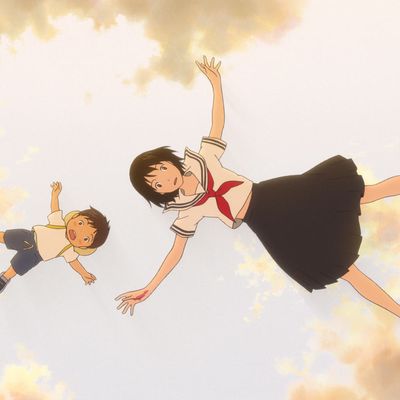
The universal ache of growing up is time-tested fodder for family movies, shot through fantastical and mundane prisms, frequently weaponized by Pixar for maximum tear-shedding. It makes sense — it’s the one imminent crisis that all children are aware of as soon as they’re aware of anything. While adults worry about the economy and war and death, children get to fixate on no longer being children. But the other main context kids have for understanding reality is their family, and while many fictional kids get to set off on adventures orphaned or otherwise untethered from family, recently films like Coco and Boss Baby (yes, Boss Baby) have done sensitive work of weaving stories between a child protagonist and the people who live before, after, and with them. Mirai, the latest animated feature from Japanese director Mamoru Hosoda, bends space and time to have it both ways: It’s about a child growing up, but also a family growing up, and every individual within that family growing up over time.
Mirai’s baby-centric premise seems like guaranteed adorability at first glance — the opening song literally snaps along to a refrain of “Cute, cute! Sweet, sweet!” as we are treated to a slideshow of the early years of an anime toddler. The setup is simple enough: Firstborn Kun gets antsy once his new baby sister Mirai shows up to steal all the attention from their overworked, stressed-out parents (voiced by John Cho and Rebecca Hall in the dubbed version). The frustration and exhaustion of a young family is obviously drawn from intimate experience, and Hosoda’s particularly observant way of animating the whims and furies of young children is given a good stretch of time to shine, unadorned. But it soon gives way to something more free-associative and genuinely childlike in logic. In a series of possibly imagined encounters, Kun stumbles into a dreamlike dimension in a small courtyard in the family’s house, learning early childhood lessons from multiple generations of his family, including the family dog (as a haughty but neglected human prince) and a grown-up adolescent Mirai.
The structure is episodic, but shambling enough that the first time I saw it, without an idea of where it was going, I found it flabby and meandering. An early sequence with “future Mirai” (Mirai literally means “future” in Japanese) spends about ten minutes too long on a not-nearly-funny-enough mission to help Mirai avoid a curse of unweddedness. Some of the little detours — such as Kun stealing his dog’s tail and the two chasing each other around the house — are playful but pointless, but the second time around, that pointlessness felt more pleasurable. Like Hayao Miyazaki, whose mantle Hosoda is often considered to be on an unofficial short list to pick up, Hosoda tells this child’s story at a child’s eye level, and the diversions feel part and parcel of that point of view.
As the encounters stack up, though, the impact of what Hosoda is starting to do starts to cohere, and it’s pretty effective stuff. The extradimensional travel is an obvious but heart-tuggingly direct way to get at the truth that everyone was a kid once, a fact that is mind-boggling when you’re a kid, and bittersweet when you’re an adult. Kun meets his mother at his age, and his great-grandfather (a regrettably hot WWII veteran) teaches him how to ride a bike. In the film’s strange, upsetting, and ultimately ravishing finale, Hosoda goes just macro enough with the concept to dazzle kids and send the adults out sobbing. Kun and Mirai go soaring through the intricacy and vastness of a single family, flitting through the ephemeral, private rooms of their ancestors’ experiences, none of which is ever quite resolved, but all of which lead to Kun and his little sister to their mother and father, and the little courtyard in their house.
Mirai has been nominated for a 2019 Oscar in Best Animated Feature Film.

